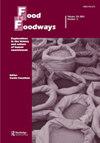非法帐篷:旧金山一家餐厅对公共空间的私人使用
IF 1.1
Q2 ANTHROPOLOGY
引用次数: 1
摘要
摘要2020年8月,在旧金山,每个人,每个餐厅,都在努力度过新冠肺炎大流行。然后,薄荷广场上的米其林星级日本餐厅Hashiri门前弹出了三个透明的塑料圆顶;Hashiri的经理向记者解释说,选择这些容纳富裕食客的圆顶是为了让不受欢迎的邻居看不见,也不碍事。在拐角处,无家可归的圣方济各会教徒睡在人行道上的帐篷里。帐篷和圆顶都在公共土地上的公共场所创造了私人空间,但该市为应对新冠肺炎疫情而制定的紧急政策只使企业和富裕客户私有化薄荷广场以进行商业和娱乐的权利合法化。在这项关于薄荷广场哈希里圆顶的研究中,我讲述了一个旧金山政府重新限制富裕餐馆游客在公共空间享受、居住和盈利的权利,同时忽视同一街区的无家可归居民的故事。本文章由计算机程序翻译,如有差异,请以英文原文为准。
The illegitimate tent: Private use of public space at a San Francisco restaurant
Abstract In August, 2020 in San Francisco, everyone, and every restaurant, was just trying to survive the COVID-19 pandemic. Then, three clear plastic domes popped up in front of Hashiri, a Michelin-starred Japanese restaurant on Mint Plaza; Hashiri’s manager explained to reporters that these domes ensconcing wealthy diners were chosen to keep unhoused neighbors out of sight and out of the way. Around the corner, unhoused San Franciscans slept in tents on the sidewalk. Tents and domes alike create private space in public on public land, but the city’s emergency policies in response to the COVID-19 pandemic legitimized only the rights of businesses and wealthy customers to privatize Mint Plaza for commerce and enjoyment. In this study of Hashiri’s domes on Mint Plaza, I recount a story of the San Francisco government re-entrenching the rights of wealthy restaurant-goers to enjoy, inhabit, and make profit on public space, while neglecting unhoused residents on the same block.
求助全文
通过发布文献求助,成功后即可免费获取论文全文。
去求助
来源期刊

Food and Foodways
ANTHROPOLOGY-
CiteScore
2.20
自引率
0.00%
发文量
16
期刊介绍:
Food and Foodways is a refereed, interdisciplinary, and international journal devoted to publishing original scholarly articles on the history and culture of human nourishment. By reflecting on the role food plays in human relations, this unique journal explores the powerful but often subtle ways in which food has shaped, and shapes, our lives socially, economically, politically, mentally, nutritionally, and morally. Because food is a pervasive social phenomenon, it cannot be approached by any one discipline. We encourage articles that engage dialogue, debate, and exchange across disciplines.
 求助内容:
求助内容: 应助结果提醒方式:
应助结果提醒方式:


